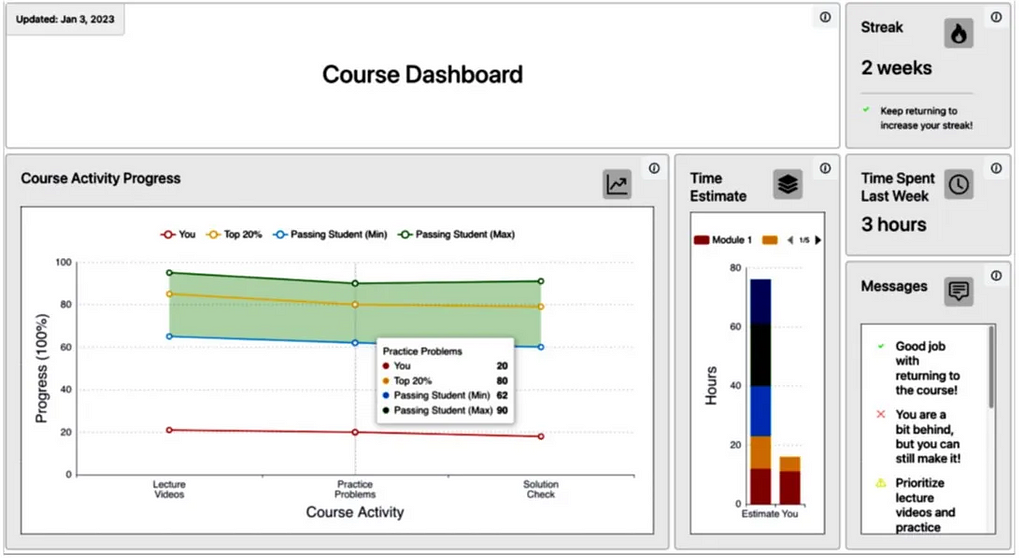
New dashboard supports online learners’ self-regulated learning and performance
Metacognitive-Learning Analytics Dashboard developed by MIT researchers personalizes actionable feedback
By Katherine Ouellette and Sara Feijo
A new learning analytics dashboard is supporting online learners’ self-regulated learning, performance, and retention. The Metacognitive-Learning Analytics Dashboard (Meta-LAD) was released this summer to provide a visual summary of learners’ course activity and help them monitor and reflect on their progress.
Meta-LAD is the brainchild of Heeryung Choi, digital learning postdoc, and Eva Ponce, executive director of the MITx MicroMasters in Supply Chain Management and research scientist at MIT Center for Transportation and Logistics (CTL). They developed the dashboard to facilitate students’ self-regulation in CTL.SC0x Supply Chain Analytics, a course that explores core methodologies used in supply chain analysis and modeling.
Meta-LAD identifies learners’ profiles and personalizes actionable feedback so students can improve their CTL.SC0x performance in real time. To determine common areas of struggle and effective, practical advice about studying and motivation, the team surveyed and interviewed previous learners who successfully passed MicroMasters courses or achieved high grades. Now, the team is analyzing that data to determine Meta-LAD’s effectiveness.
“In our initial analysis, we discovered that our dashboard was particularly beneficial for students at risk — achieving a higher final course grade and successfully passing the course,” Choi says.
On October 12, Choi will present about the Meta-LAD dashboard with Inma Borrella, CTL research scientist, and Eva Maria Ponce Cueto, CTL research engineer, at the IEEE 2023 Learning with Massive Open Online Courses conference at MIT.

In addition to helping students develop the critical skill of self-regulation, Choi says the teams at the Micromasters in Supply Chain Management program and CTL are always keen to incorporate the latest learning science research and use cases to improve learner outcomes for their courses.
A member of the Digital Learning Lab (DLL), part of MIT Open Learning, Choi analyzes real course data and learner surveys to determine potential redesigns of the online learning environment that could increase the chances of learner success.
After discerning where learners get stuck, which course modules learners did or did not find effective, and the study habits of learners who passed or completed the course, Choi uses that contextual information to make recommendations on how to improve the learner experience.
“The members of the DLL are very interested in making an impact in learners’ experiences and learning environments,” says Choi. “There’s a discrepancy between the amount of content academia wants to cover and what practitioners can actually accomplish with their available bandwidth. The MicroMasters team knows the DLL focuses on real-world applications.”
New dashboard supports online learners’ self-regulated learning and performance was originally published in MIT Open Learning on Medium, where people are continuing the conversation by highlighting and responding to this story.

